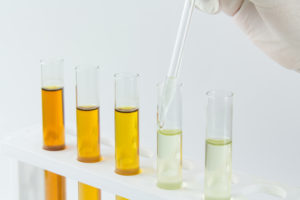Viscosity In-Depth Review - September 10, 2019

When it comes to automatic transmission fluid and transmission fluid additives there has been one source for products and advice that has consistently added to the success and profitability of the automotive aftermarket, LUBEGARD by I.L.I. We created the “one fluid solution” using
DEX/MER ATF and LUBEGARD ATF PROTECTANTS 25 years ago to revolutionize the transmission fluid change industry. We did this with our incredible proprietary LXE Technology and an understanding of what it takes to make a functional, safe replacement for expensive and often difficult to get OEM ATF’s. Other products quickly came into the marketplace and claimed to provide the same value and high performance as LUBEGARD, but quickly disappeared from the market when their products didn’t work well and mounting problems required technical expertise that was not available from the suppliers of these “me too” products. Over the years we have prospered and done well by providing products, advice (best conversion guidelines in the business) and technical backup (LUBEGARD TECH HOT LINE) that has allowed shops to use LUBEGARD products with a minimum of problems. This results in high levels of customer satisfaction and (in the rare event of a problem or failure) professional backup and technical assistance when it matters the most. LUBEGARD from INTERNATIONAL LUBRICANTS INC., has been the service professional’s best insurance policy.
 Recent changes in the viscosity requirements for many newer transmissions have reduced the operational viscosity of ATF to improve efficiencies, but, not without problems like less wear protection, and frictional issues like shudder. The question from many professionals wanting to use LUBEGARD ATF Protectants to solve these fluid problems is, does LUBEGARD have an adverse effect on the viscosity of these newer, much thinner ATF’s? To alleviate these fears, we performed a study of these fluids and their effect on viscosity and wear.
Recent changes in the viscosity requirements for many newer transmissions have reduced the operational viscosity of ATF to improve efficiencies, but, not without problems like less wear protection, and frictional issues like shudder. The question from many professionals wanting to use LUBEGARD ATF Protectants to solve these fluid problems is, does LUBEGARD have an adverse effect on the viscosity of these newer, much thinner ATF’s? To alleviate these fears, we performed a study of these fluids and their effect on viscosity and wear.
Four representative low-viscosity ATFs were selected:
- ZF Lifeguard 8 as a representative European standard;
- Mercon ULV as a representative North American standard;
- Dexron VI as a representative North American standard;
- Toyota WS as a representative Asian standard.
The low viscosity of these fluids are specified by the 100°C Kinematic viscosity measurement. Nevertheless, the Kinematic viscosity of each fluid was measured at 40°C and 100°C according to ASTM 2532, so that a Viscosity Index could be calculated. Lubegard Synthetic ATF Protectant (Red), Lubegard Platinum ATF Protectant (Platinum), and Lubegard HFM ATF Supplement (Black) were added to each fluid at the recommended 1 fluid ounce per quart (3.125% by volume) concentration. The same viscosities were measured for each mixture.
Figure 1

The viscosities at 100°C increased between zero and 2.5% and none of the fluids exceeded its 100°C specification with the addition of Lubegard protectants.
The viscosities at 40°C also increased slightly with the addition of the Protectants. The range of the neat fluids was 20.2 to 28.3. With the Protectants the range increased to 20.6 to 29.2.
The Viscosity Index of the ATFs varied between 146 and 180. Addition of the Protectants decreased the range insignificantly to 147 to 178.
The wear protection properties of the fluids were tested by the Four-Ball wear method, ASTM 4172.
Figure 2
In every case, the Lubegard Platinum Protectant improved the wear protection. The Synthetic Protectant improved all the ATFs but the already-effective, ZF Lifeguard 8, in which it did no harm to the wear protection. The HFM ATF supplement, which is formulated for friction modification and not necessarily wear protection, had a similar effect on wear protection as the Synthetic Protectant.
The conclusion of this study is that Lubegard ATF Protectants are suitable for use in the Low Viscosity ATFs and will not change the viscosity significantly when added as directed. Furthermore, the Protectants add significant wear protection to the ATFs.

